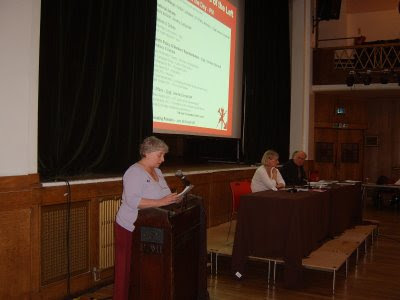 by New Worker correspondent
by New Worker correspondentTHE LABOUR Representation Committee conference in London last Saturday, attended by hundreds of left-wing Labour Party, trade union and other left organisations, presented a remarkably united front, endorsing 19 out of the record 20 resolutions submitted to it.
Organisations that submitted successful resolutions included the New Communist Party, the Campaign for Socialism, Socialist Appeal, Lambeth and Southwark LRC, the Communication Workers’ Union, PCS Labour Left, Unison North East Essex Mental Health Branch, Branch 558 of the BFAWU bakers’ union, Nottingham NUM Ex and Retired Miners Association and the Socialist Youth network.
Over two hundred delegates packed the Conway Hall for the LRC’s annual conference that was held under the title “The Future of the Left” to discuss the way forward and elect the new national committee.
The only resolution that was defeated, from the Trotskyist Alliance for Workers’ Liberty, contained a clause calling for support of “non-Labour socialist candidates” in elections that would have given the Labour Party a legitimate reason to expel all LRC members and supporters.
The current economic crisis and building a united working class response to it dominated the speeches and discussions.
Left Labour veteran Tony Benn delivered the opening speech, pointing out that the people of Britain are now well to the left of the Labour government and questioning Gordon Brown’s decision to cut taxes. “Who does this really benefit?” he asked. “What do they really mean when they say, ‘We will do whatever it takes’.”
He concluded saying: “We need to be confident and people will come to us.”
Ogmundur Jonassen an MP from the Icelandic VG (Left Green) party delivered the first of two international contributions. He explained that the Icelandic people, like the British, were suffering from the effects of a government that has pursued the policies of Friedman and Hayek.
He also made a strong attack on the British government decision to use anti-terrorist legislation to freeze Icelandic assets in Britain when the Icelandic bank Landisbank collapsed.
Jonassen pointed out that the actions of the United States banks and government had done serious damage the British economy but Gordon Brown’s government had not used anti-terror legislation against them.
He said the measures did nothing to benefit the British working people and seriously damaged the welfare of Icelandic working people.
“The people of Britain are not to blame and the people of Iceland are not to blame. It is the unjust and corrupt capitalist system that is to blame,” he said.
The other international contributor was Audun Lysbakken, deputy leader of the Norwegian Socialist Left (SV) party, who also linked the struggles of the working class in his country with those in Britain.
Other speakers included Katy Clark MP, Jeremy Corbyn MP, Jeremy Dear (NUJ), John McDonnell MP and Matt Wrack (FBU).
Jeremy Dear led the debate on the economy, pointing out that we do not simply want Britain restored to the condition it was in before the crash – that would only lead to the same problems happening again. “There is an opportunity here for a complete transformation of society,” he said. And he called for an end to tax avoidance used by wealthy individuals and corporations.
John McDonnell spoke on the acute housing crisis and the scandal of Government encouragement to buy-to-let landlordism and the shortage of council housing that drove rents up.
He also reminded conference of two million pensioners still living in poverty and of the recession of the 1980s that saw “a whole generation brought up in unemployment”.
McDonnell also spoke of the hardships of the migrant workers in his constituency, with three or four asylum seekers being deported daily.
He spoke of immigration service and police raiding homes in the early hours of the morning and raising work places during the day; of people being dragged away in handcuffs and forcibly put on planes before they had any chance to appeal.
And he reminded conference that “the Government is sending people back to the Democratic Republic of Congo, Iraq and Afghanistan”.
The New Communist Party resolution on combating the dangers of fascism and racism was moved by NCP central committee member Daphne Liddle.
The resolution was in two parts, covering the dangers from the British National Party, which is trying to fill a gap in our local communities left by the disappearance of locally active constituency Labour and other parties.
She called for a return to door-to-door canvassing where the lies of the BNP can be properly countered.
The resolution also called for the repeal of unjust immigration and asylum acts, “anti-terror” legislation and an end to the growing “surveillance state” and to private sector involvement in the administration of the state.
Four other members of the NCP took part in the conference including NCP leader Andy Brooks and Michael Fletcher, who successfully moved the motion on low pay and trade union rights on behalf of his Unison N E Essex Mental Health branch.
The LRC is supported by nine Labour MPs, a number of trade unions at national and regional level, and socialist, co-operative and progressive movements, including the NCP, that do not stand against Labour in elections .
photo: Daphne Liddle moving the NCP motion

